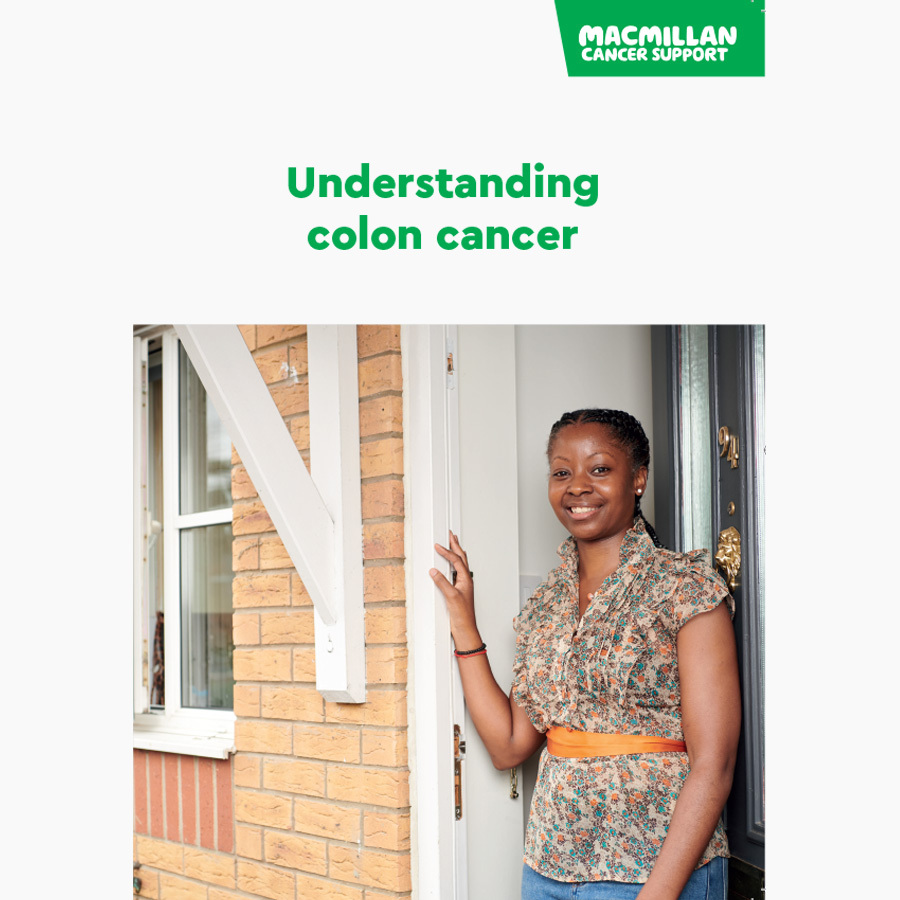What is colon cancer?
Colon cancer is a cancer that starts in the colon. The colon is part of the large bowel, which is part of the digestive system. The large bowel is made up of the colon, rectum and anus.
Cancer that starts in the colon or rectum might be called bowel cancer or sometimes colorectal cancer.
Our information on bowel cancer is also for anyone with either colon cancer or rectal cancer.
Clinical Oncologist Katherine Aitken explains bowel cancer (which includes colon cancer) in the video below. She gives an overview of bowel cancer symptoms, diagnosis and treatment.
In the UK, about 44,100 people get cancer in the colon or rectum each year. Bowel cancer is more common in older people. But the number of younger people 50 and under diagnosed with it is increasing.
We have more information about other types of bowel cancer including:
Related pages
Booklets and resources
Symptoms of colon cancer
Some people may start by seeing their GP because they have symptoms. Symptoms of colon cancer can include:
- blood in your poo (stools)
- bleeding from the back passage
- a change in your normal bowel habit.
If you are worried about colon cancer, we have more information about bowel cancer symptoms.
Related pages
Causes of colon cancer
Doctors do not know the exact causes of colon cancer. But there are risk factors that can increase your chance of developing it.
Having 1 or more risk factors does not mean you will definitely get colon cancer. Some people without any risk factors might get colon cancer.
Risk factors include:
- age
- dietary or lifestyle factors
- having an inflammatory bowel condition
- a family history of bowel cancer.
We have more information about the causes and risk factors of bowel cancer.
Diagnosis of colon cancer
If you have symptoms, you will usually begin by seeing your GP, who will examine you. If they think that your symptoms could be caused by cancer, they will refer you to a specialist doctor.
The specialist doctor will examine you and you will usually have some tests. These include a rectal examination and a blood test.
You usually also have test called a colonoscopy. A doctor or nurse uses a thin tube with a camera at the end to examine the inside of the whole bowel.
Or you might have a sigmoidoscopy to examine the inside of the rectum and the part of the colon closest to the rectum.
Some people are diagnosed with colon cancer through the NHS Bowel Screening Programme. We have more information about bowel cancer screening.
We have more information about the tests you may have and how colon cancer is diagnosed.
Waiting for test results can be a difficult time. We have more information that can help.
Related pages
Staging and grading of colon cancer
The results of your tests help your doctors find out more about the size and position of the cancer and whether it has spread. This is called staging.
A doctor decides the grade of the cancer by how the cancer cells look under the microscope. This gives an idea of how quickly the cancer might grow or spread.
Knowing the stage and grade helps your doctors plan the best treatment for you.
Treatment for colon cancer
A team of specialists will meet to discuss the best possible treatment for you. This is called a multidisciplinary team (MDT).
Your doctor or cancer specialist or nurse will explain the different treatments and their side effects. They will also talk to you about things to consider when making treatment decisions.
Before your treatment starts your cancer team might talk to you about preparing for your treatment. This is sometimes called prehabilitation. It can help you improve your fitness, health and well-being before treatment. It can also help you recover more quickly. We have more information about preparing for bowel cancer treatment (prehabilitation).
Surgery is the most common treatment for colon cancer. The type of operation you have depends on the stage of the cancer and where it is in the colon. You might have chemotherapy as well as surgery.
Your treatment also depends on your general health and preferences. Other cancer treatments may also be used.
Treatment for colon cancer may include:
-
Surgery
Surgery is often used to remove the part of the colon where the cancer is. Some people may need a temporary or sometimes a permanent colostomy (stoma) after surgery. This is an opening the surgeon makes through the tummy (abdominal) wall. It connects the bowel to the surface of the tummy.
Most people have changes in how their bowel works after treatment for colon cancer. These effects usually improve over time.
-
Chemotherapy
Chemotherapy uses anti-cancer drugs to destroy cancer cells. You may have chemotherapy after surgery to reduce the risk of the cancer coming back. Some people have chemotherapy before surgery.
Find out more about treatment options for colon cancer.
Advanced colon cancer
If you have colon cancer that has come back or spread to other parts of the body, you may have treatment with a targeted therapy or immunotherapy drug.
You usually need tests on the cancer cells to help you and your doctor to decide about the best cancer drug treatment for you. This can depend on whether the bowel cancer cells have certain types of gene changes.
Chemotherapy is also commonly used to treat advanced colon cancer. Surgery, ablation and different types of radiotherapy can also be used depending on where in the body colon cancer has spread to.
We have more information about treatment for advanced bowel cancer.
You may have some treatments as part of a clinical trial.
After colon cancer treatment
Follow-up after treatment for colon cancer
You will have regular check-ups during and after your treatment. These usually continue up to 5 years. You may have:
- regular blood tests
- CT scans
- colonoscopies.
Tell your doctor or specialist nurse as soon as possible if you have any problems or notice new symptoms between appointments.
We have more information on follow-up care after treatment.
Sex life
Colon cancer and its treatment can affect your sex life. Changes may get better over time, but sometimes they are permanent. If you have any problems or are worried about this talk to your doctor or nurse. They can explain what to expect and there are often things that can help.
We have more information on your sex life after bowel cancer.
Body image
Fertility
Some cancer treatments can affect whether you can get pregnant or make someone pregnant. If you are worried about this, it is important to talk with your doctor before you start treatment.
Support after colon cancer
People often have many different feelings when they finish colon cancer treatment. You may feel relieved that treatment has finished, but worried about what will happen in the future.
We have information below about some of the things people ask about after colon cancer treatment. But you may have other questions or need information about something else.
Macmillan is here to support you. If you would like to talk, you can:
- call the Macmillan Support Line for free on 0808 808 00 00
- chat to our specialists online
- visit our bowel (colon and rectal) cancer forum to talk to people who have been affected by bowel cancer, share your experience, and ask an expert your questions.
Other organisations who offer information and support include:
Well-being and recovery
It can take time to recover after colon cancer treatment. Some days you may feel better than others.
Looking after yourself can help speed up your recovery. Even small lifestyle changes may improve your well-being and long-term health.
Even if you already have a healthy lifestyle, you may choose to make some positive changes after treatment. We have more information on leading a healthy lifestyle after treatment.
It is important to know where to get support or information if you need it. People often need support even some time after colon cancer treatment. But sometimes it is difficult to know who to ask for help. To find support:
- ask your GP or someone from your cancer team for advice about support in your area
- search cancercaremap.org to find cancer support services near you
- call us free on 0808 808 00 00 or talk to us talk to us online - our cancer information and support specialists can offer guidance and help you find what you need.
About our information
This information has been written, revised and edited by Macmillan Cancer Support’s Cancer Information Development team. It has been reviewed by expert medical and health professionals and people living with cancer.
-
References
Below is a sample of the sources used in our colon cancer information. If you would like more information about the sources we use, please contact us at informationproductionteam@macmillan.org.uk
National Institute for Health and Care Excellent (NICE). Colorectal cancer: diagnosis and management clinical guidelines. Updated December 2021. Available from: www.nice.org.uk/guidance/NG151 [accessed November 2023].
KJ Monahan, MM Davies et al. Faecal immunochemical testing (FIT) in patients with signs or symptoms of suspected colorectal cancer (CRC): a joint guideline from the Association of Coloproctology of Great Britain and Ireland (ACPGBI) and the British Society of Gastroenterology (BSG). Gut. 2022; 71:1939-1962. Available from: https://gut.bmj.com/content/71/10/1939 [accessed December 2022].
Cervantes A, Adam R, Rosello S, et al. Metastatic colorectal cancer: ESMO Clinical Practice Guideline for diagnosis, treatment and follow-up. Annals of Oncology. 2023 Jan; 34(1):10-32. doi: 10.1016/j.annonc.2022.10.003. Epub 2022 Oct 25. Available from: www.annalsofoncology.org/article/S0923-7534(22)04192-8/fulltext [accessed February 2023].
Date reviewed

Our cancer information meets the PIF TICK quality mark.
This means it is easy to use, up-to-date and based on the latest evidence. Learn more about how we produce our information.
The language we use
We want everyone affected by cancer to feel our information is written for them.
We want our information to be as clear as possible. To do this, we try to:
- use plain English
- explain medical words
- use short sentences
- use illustrations to explain text
- structure the information clearly
- make sure important points are clear.
We use gender-inclusive language and talk to our readers as ‘you’ so that everyone feels included. Where clinically necessary we use the terms ‘men’ and ‘women’ or ‘male’ and ‘female’. For example, we do so when talking about parts of the body or mentioning statistics or research about who is affected.
You can read more about how we produce our information here.







